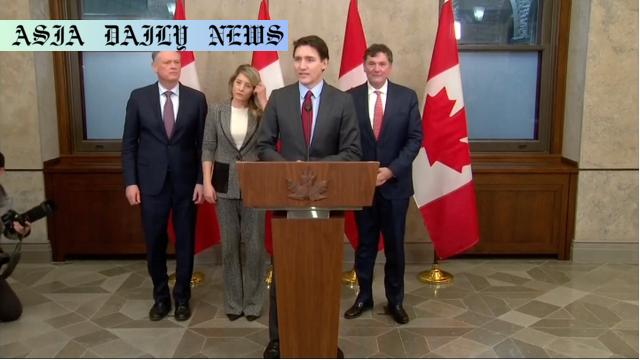Tariffs – Canada responds to US tariffs with domestic buying push and governmental actions to protect its economy.
Canada hits back at US tariffs with a 25% duty in retaliation.
Trudeau urges Canadians to ‘choose Canada’ by buying local products.
Ontario and BC introduce measures to remove certain US goods from shelves.
Trump dismisses the impact of Canadian actions on the US economy.

Introduction to the Trade Dispute
Canada and the United States have recently found themselves at an impasse over new tariffs imposed by the US government. President Donald Trump announced a 25% tariff on imports from Canada, prompting swift retaliation from Canadian Prime Minister Justin Trudeau. This escalating trade conflict has sparked widespread concern over the implications for both national economies and the larger global market.
Canada’s Response to the Tariffs
Prime Minister Trudeau wasted no time in addressing the issue, implementing a reciprocal 25% tariff on US imports. His strong stance was communicated on social media, where he encouraged Canadian consumers to prioritize domestic goods. “Now is the time to choose products made right here in Canada. Check the labels. Let’s do our part. Wherever we can, choose Canada,” he stated.
Provincial Actions Escalate the Push
Supporting Trudeau’s national directive, provincial leaders like Ontario Premier Doug Ford and British Columbia Premier David Eby added weight to the campaign. In Ontario, American alcohol will be removed from the provincial wholesaler’s catalog starting Tuesday. This move aims to reduce dependency on US products and promote local alternatives. Meanwhile, in British Columbia, Eby has directed the Liquor Distribution Branch to halt buying American liquor from Republican-led states.
Impact on US-Canada Relations
The tariffs have fueled significant tension between the two neighboring nations, historically known for their robust trade partnership. President Trump struck back harshly, downplaying the economic effect of Canada’s decisions. Taking to social media, Trump suggested Canada would benefit more as the “51st state” of the United States. He also asserted that the US has an abundance of resources like energy, cars, and lumber, claiming minimal reliance on Canadian imports.
Economic and Global Implications
This dispute comes with broader implications, raising concerns over the global economy and inflation. Canada has positioned itself as a strong advocate for fair trade, but these retaliatory measures are expected to increase costs on both sides of the border. For the United States, the tariffs may worsen inflation, while impacting Canadian businesses dependent on US imports.
The Role of Consumer Behavior
Given Trudeau’s calls for citizens to actively “choose Canada,” much emphasis has been placed on consumer participation. By making intentional domestic purchase decisions, Canadian shoppers hold the power to counteract the effects of the tariffs. This behavioral push aligns with provincial legislative actions, creating a multi-layered strategy to defend against economic losses.
Conclusion: Moving Forward
The trade impasse underscores the fragility of cross-border economic relationships in a politically charged environment. While the Canadian government leads a strong campaign, its long-term success hinges on consistent participation from citizens and businesses alike. The situation reminds both countries of the importance of collaboration, even amid disagreements. It remains to be seen if these bold moves will foster compromise or deepen divisions further.



Commentary
Reflecting on Canada’s Bold Retaliation
The recent trade tensions between Canada and the United States highlight the challenges of maintaining a balanced and mutually beneficial economic relationship in the modern era. By imposing retaliatory tariffs and urging citizens to ‘choose Canada,’ Prime Minister Trudeau has taken a clear and assertive stance. This approach not only signals Canada’s refusal to back down but also serves as a reminder that smaller nations can wield significant influence in global trade dynamics.
Consumer Power Amidst Economic Conflict
One of the most compelling aspects of Canada’s response has been the emphasis on consumer responsibility. The move to actively encourage citizens to purchase local products goes beyond government action, fostering a sense of national unity. However, this raises questions about the sustainability of such measures in the longer term. Will Canadian consumers continue to prioritize local goods when prices rise or when cheaper American alternatives re-emerge?
Future Prospects for US-Canada Trade Relations
Looking ahead, it remains uncertain how these actions will shape bilateral trade relations. Canada’s approach, while bold, could lead to unintended repercussions, such as supply chain disruptions or strained partnerships with US businesses. On the other hand, it could inspire greater self-reliance and innovation within Canadian industries. The path forward will likely require careful negotiation and, hopefully, a renewed commitment to collaboration between these two neighboring nations.